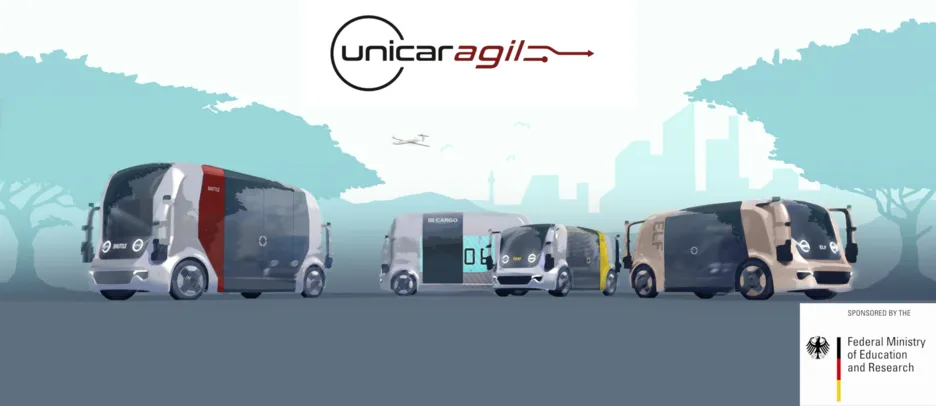

Motivation
In meeting the challenges of increasing mobility needs and urbanization, autonomous electric vehicles will play a key role. They create the basis for sustainable and intelligent traffic, novel mobility and transport concepts as well as improvements in traffic safety and quality of life in urban areas.
Goals and Approach
In the project UNICARagil, a consortium of several German universities is working together with their respective research priorities. Fully automated driverless vehicles will be developed based on the research into automated and connected driving and electric mobility. The basis is a modular and scalable vehicle concept including the use and the drive unit. It can be flexibly adapted to various applications in logistics and passenger transport, which can be sensibly developed by driverless, emission-free vehicles. The goal of the project is the demonstration of the four use cases private car, taxi, delivery and shuttle.
Work package at the FTM
The Institute of Automotive Technology (FTM) is responsible for the operations center and the build-up of the interior and exterior of the taxi (autoTAXI). As a supplement to the line-based public transport, passengers will be able to use the autoTAXI for individual trips in urban environments. The vehicles can be booked by smartphone or opened and used directly on the street.
The operations center personnel monitors the fleet of autonomous vehicles, affects their behavior and controls single vehicles when necessary. On the one hand, the operations center gains the users’ trust since the users can communicate with the operations center personnel if required. On the other hand, the operations center extends the operational design domain of the autonomous vehicles. For example, if an autonomous vehicle reaches the boundaries of its operational design domain, the operations center takes over the control and brings the vehicle back in an autonomous mode.
The build-up of the autoTAXI includes all steps from conceptual design, construction, installation and startup to testing. The special needs of an autonomously driving vehicle should be considered in the vehicle concept and implemented in the construction. The test field for testing the autoTAXI prototype is located on TUM's university campus Garching.
Contact operations center: Johannes Feiler, M.Sc.
Contact autoTAXI: Alexander Koch, M.Sc., Ferdinand Schockenhoff, M.Sc., Adrian König, M.Sc., Philipp Hafemann, M. Sc.
Further Information about the project are published here: Project UNICARagil
